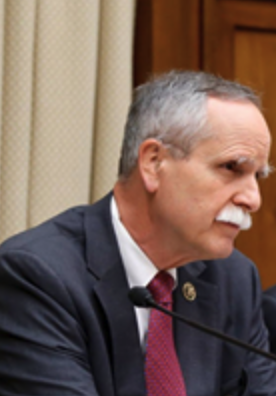
Democrats Using The Pandemic To Fund Partisan Wish List
House Democrats are forcing a vote on their partisan COVID relief bill. During this process, Democrats refused to negotiate with Republicans on any amendments that would provide real relief for the American people, including the amendment that Representative McKinley offered that would support additional funding for Americans who are suffering from the opioid crisis.
Less than 9% of the $1.9 trillion plan goes to combatting COVID-19, instead the partisan bill:
-Kills 1.4 million jobs by raising the national minimum wage by 107% to $15/hour
-Provides an additional $130 billion to schools without any guarantee for in-person instruction
-Requires taxpayers to subsidize health plans that potentially cover elective abortions
-Illegal immigrants would be eligible for some benefits included in the package
Democrats’ Climate Agenda is Bad for American Jobs
This week, Representative McKinley questioned the viability of clean energy proposals and highlighted how many suggestions from Democrats would put millions of hard-working Americans out of work:
“I guess the issue is can America decarbonize? Absolutely. I would agree, it can, but what’s the cost to families, communities, and businesses that are reliant on fossil fuels? This report that everyone is referring to was silent about Hazard, Kentucky, Gillette, Wyoming, Cadiz, Ohio. There are no transitional employment opportunities in those areas.”
Bringing Broadband to Rural Communities
This week, Representative McKinley reintroduced the Facilitating the Deployment of Infrastructure with Greater Internet Transactions And Legacy Applications (Facilitating DIGITAL Applications) Act. This legislation would make it easier to develop and permit broadband infrastructure on federal property through online applications.
“Millions of rural Americans currently lack access to high-speed broadband. During unprecedented times like these, being able to access the internet is vital to the success of parents, teachers, students, and rural communities,” said Rep. McKinley. “This bill helps streamline the application process and make it easier for telecommunication companies to apply for permits so they can build out this critical infrastructure on federal land. This is a positive step in the right direction to close the digital divide in West Virginia and across the country.”
Creating Incentives for Carbon Capture Technology
This week Representative McKinley and Representative Marc Veasey (D-TX) reintroduced the Accelerating Carbon Capture and Extending Secure Storage through 45Q (ACCESS 45Q) Act. This bipartisan legislation extends the date for projects to begin construction to claim the 45Q tax credit for carbon dioxide sequestration by ten years. It also tweaks the tax credit to make it more attractive to developers.
“As we seek to recover from the COVID-19 pandemic and regain our position as a global energy leader, we must do everything we can to encourage innovation and develop clean energy technologies like carbon capture,” said Rep. McKinley. “The 45Q tax credit is the single-most useful tool in spurring the development of carbon capture projects. This bill will lead to more projects and more widespread adoption, which is critical to reduce emissions and preserve the future of coal and natural gas.”
“This bipartisan legislation builds off our previous work to expand the 45Q tax credit and provides the certainty needed to develop carbon capture projects and use our energy resources in the cleanest way possible,” added Rep. McKinley.
Funding to Support the Opioid Crisis
This week Representative McKinley, along with Reps. David Trone (D-MD), Guy Reschenthaler (R-PA), Teresa Leger Fernandez (D-NM) introduced the bipartisan Opioid Patients’ Right to Know Act to help prevent opioid addiction across the country.
The Opioid Patients’ Right to Know Act would create a grant program to incentivize states to require prescribers to discuss the addictive qualities of the drugs with patients and inform them of alternative treatment options before prescribing them for acute pain.
“The opioid crisis continues to take the lives of tens of thousands of Americans across the nation and the pandemic has only exacerbated this epidemic,” said Rep. McKinley. “This bill strengthens communication between patients and prescribers to ensure patients have the information they need to make educated decisions. People need to know the true risks when considering options to manage their pain and understand there are alternatives to highly addictive opioids.”
